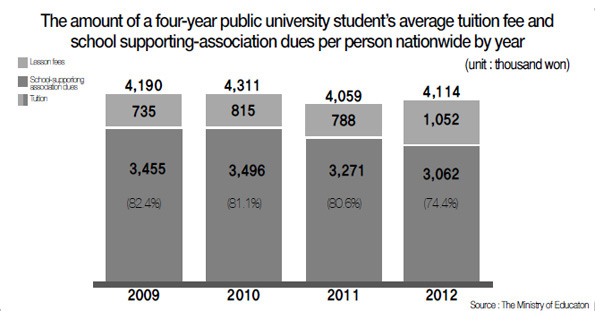
University students won the second round trial which targeted national universities on the refunding of school-supporting association dues. On November 7th, 2013, the Seoul High Court said, “The school-supporting association dues, where the schools have collected the dues from the students by force, have no legal basis. That money should be only collected from students who join the school supporting association, so schools have to ask students’ permission about joining that association. However, without this procedure, the schools have no right to get the dues. If students win in the Supreme Court, the universities can’t collect the school-supporting association dues compulsorily, and they will have to refund all the dues that were collected before to 1.95 million students and graduates.
Originally, the school-supporting association dues were a kind of donated money to supplement national universities’ budgets. However, now, most universities include the dues with total tuition fees and collect them by force. In addition, schools increase the dues to get more tuition money.
Dispelling this problem, the Ministry of Education suggested a law of national university accounting. This law is for supplementing the lack of autonomy in national university financing. The national universities financial accounts are divided into one legal account and another one with no legal basis. The legal account is for lesson fees and the other is for school-supporting association dues. The law would integrate those two accounts into one legal account. However, the Ministry of Education is taking lots of criticism.
The main criticism is the indifference of the government approach to the problem of school association dues. The government has dismissed this problem of raising the school association dues for expanding the national universities’ educational financing. In addition, looking at Article 20 of the Decree on the Establishment of National Schools, the government has the fiscal duty of the management of national universities, but they have reduced the university financial budgets. Lee Won-jong, a lawyer who participated in the panel of the symposium and discussed the judgment result on school association dues, said, “Taking more money from the students is not only the schools’ fault.” He added, “Truly, the main agent to set and distribute school association dues is the government. Distributed money to schools from the government is not enough for managing the schools. That’s why schools get more money from the students.” According to research by the Ministry of Education, the percentage of the national university association dues of total school tuition fees in 2010 was 84.6% on average. It is more than five times the legal tuition.
Another criticism is the matter of the cost that will be borne by the students after passing the finance accounting law. If the case of the finance accounting law is enacted, university finances will be integrated into the tuition fees, so it would not be possible to collect the fee. Without more variables to increase the financial support of the government, universities would have no choice but to impose higher tuitions and the amount would be added to school association dues. In other words, students would pay the “illegal school association dues” as “legal school tuition fees”. Private universities are good examples of this, where the universities eliminated the illegal fees, but the tuitions were raised after the private universities accepted the law.
The national universities complained about the financial autonomy of universities. Although the government said, “The purpose of this law is increasing the financial autonomy at universities”, national universities argued that this law is the centralization of university finances by the government. According to the claim, the illegal money would be legal money for the government account. Then schools would give all the money to the government, so national universities would have no money to manage autonomously. In addition, universities would have nothing to do but to rely on the government. The head of accounting in Chungbuk National University said, “When our school receives the dues, the main reason to get the dues is the non-governmental account. Due to it, we can use the dues flexibly depending on our situation. However, if the bill is enacted, economic anxiety will follow fierce competition in order to get more money from the government, and the financial gap between schools is going to be more serious than before. In addition, the government will make more rules and a more detailed budget than before to strengthen the centralization.
The question whether the law is the first step to making a new government body has also been raised. The reason is that it consists of similar contents with a law that tried to strongly promote a government body in the Lee Myung-bak administration, but it was canceled because of a backlash of public opinion. The University Institute of Education, which studies and analyzes empirically the actual situation of university education, determined that the law will promote a new body of the government.
To attract concern to this problem, the ‘University Students Union’ is doing a declaration to the national university students across the country. They have 4 requests. One is the objection to the financial accounting law, the second is the realization of decreasing tuition by expending educational finances, the third one is strengthening the national university education quality, and the last one is making new laws for national universities.
The Seoul National University became a part of the government with the creation of the law. The school account system was changed, so schools had no choice but to increase tuition fees the same amount as the school dues. It shows that the law might not be a good alternative to make the student’s tuition burden lighter and that the government has to create a fundamental policy to solve the problem.
By Lee Da-yeon
dy34@cbnu.ac.kr


 All
All Campus News
Campus News






 Lee Da-yeon
Lee Da-yeon











